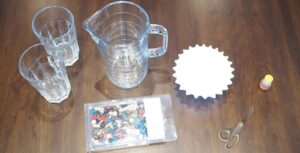During the Spring of 2010 (March 1), Cooper’s mother (Heidi) arrived home from a business meeting and had been gone 2-3 days. When she left, Cooper had a viral infection, runny nose and cough. He was always sick those days thanks to daycare. She went to pick him up and he was heavier than when she left, his face looked swollen especially his eyelids. Then she noticed Cooper’s abdomen was distended and full of fluid. Heidi is a Nurse Practitioner and after researching, found it to be possible that Cooper had Nephrotic Syndrome.
Following this, the family met with their pediatrician, ran tests, and was later admitted to the hospital. The journey began: Cooper responded to steroids but relapsed with each taper. The struggle to get him to take liquid prednisone was difficult, however, they were successful. After 5-6 relapses that first year, the medical team added Cellcept and were able to wean off his steroids. Cooper had 8 months of medicated remission. Cellcept stopped working, the family/medical team added tacrolimus to Cooper’s regiment, but he still required lots of steroids. Luckily, he tolerated them well and had minimal side effects. Eventually these medications became ineffective. Cooper was transitioned to Rituximab infusions which also helped for a while. Unfortunately, he developed hives and had to be given the drug in the ICU setting with allergy at the bedside…
After a thoughtful discussion and extensive review of Cooper’s records, a course of cyclophosphamide was recommended. It was successful and Cooper is in a partial remission, stable proteinuria and a normal albumin.
Rituximab then stopped working. Cooper developed a pulmonary embolus and required hospitalization for anticoagulation. It was managed medically. But the relentless relapses kept on reoccurring. The family applied for compassionate use of Ofatumumab. Cooper was miserable with lots of vomiting, swelling and fatigue. After several hospitalizations to administer Ofatumumab, he had no response. So, Cooper ended up going in for IV albumin and furosemide a few times a week to manage some of his symptoms. Cooper had a repeat biopsy of his kidney which indicated some scarring but still consistent with minimal change disease. At this time, the family was discussing pheresis and additional genetic testing as well as options including nephrectomy and transplant. They then decided to get a second opinion. Heidi and her husband had a virtual review done by Boston’s Children and then went to see a nephrologist at Wisconsin Children’s hospital. She had spoken to one of her favorite adult nephrologists and he pointed her in this direction.
After a thoughtful discussion and extensive review of Cooper’s records, a course of cyclophosphamide was recommended. It was successful and Cooper is in a partial remission, stable proteinuria and a normal albumin. Cooper is currently taking a drug called dapagliflozin (farxiga). It is unclear if it is making a difference, but it has been 9 months since his last albumin infusion and course of cyclophosphamide. The drug was suggested by one of Heidi’s colleagues who is a bench researcher and knew Cooper was ill. The colleague sent Heidi some articles and wanted to let her know that the drug may help. Following Heidi’s advocating for Cooper and speaking with the nephrologist as well as much discussion with the team, they decided to prescribe it. Heidi is uncertain exactly why Cooper is better these days and reports that it could probably be due to a combination of treatments and maybe puberty, however, they celebrate this string of good days while acknowledging it could all change so quickly.



